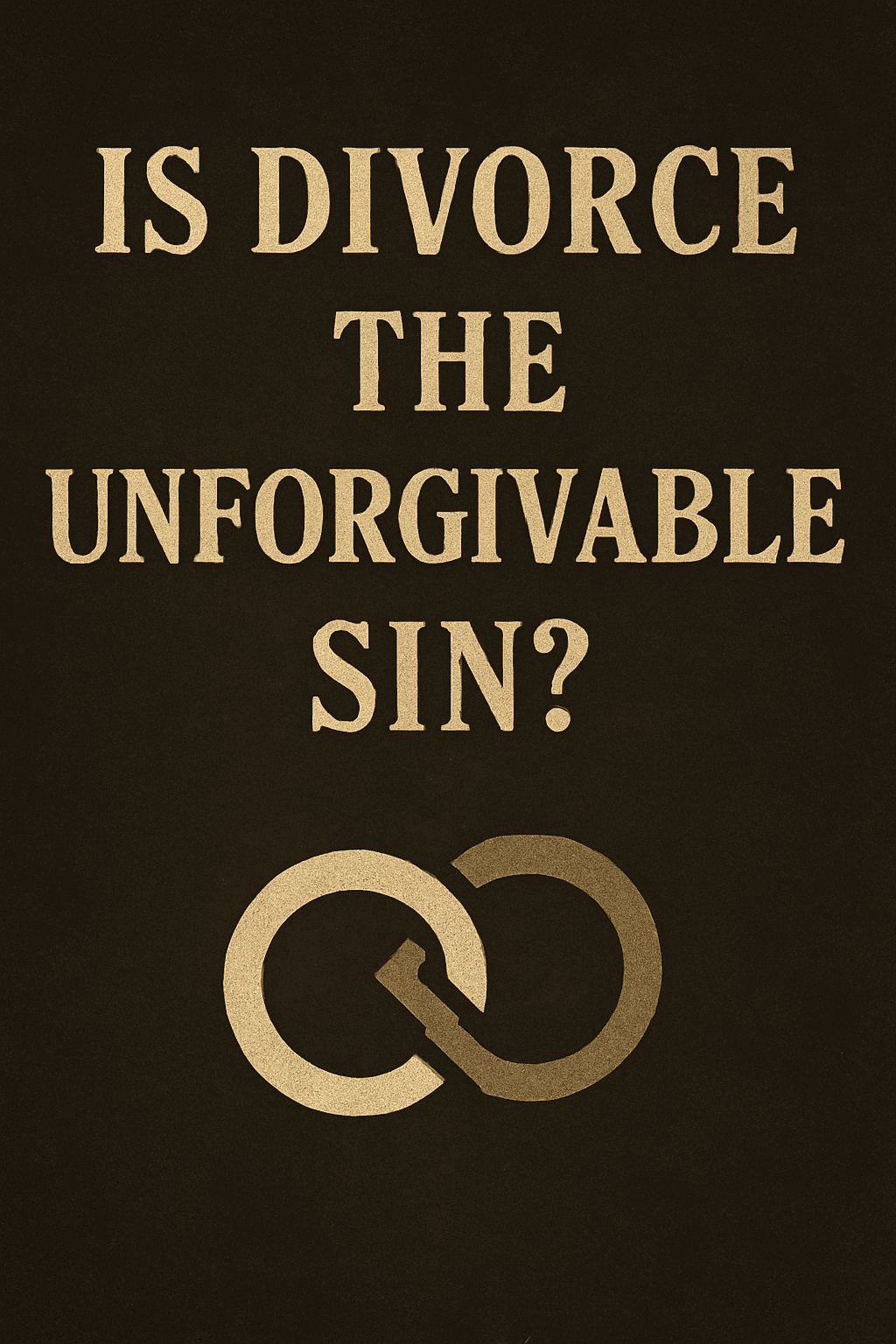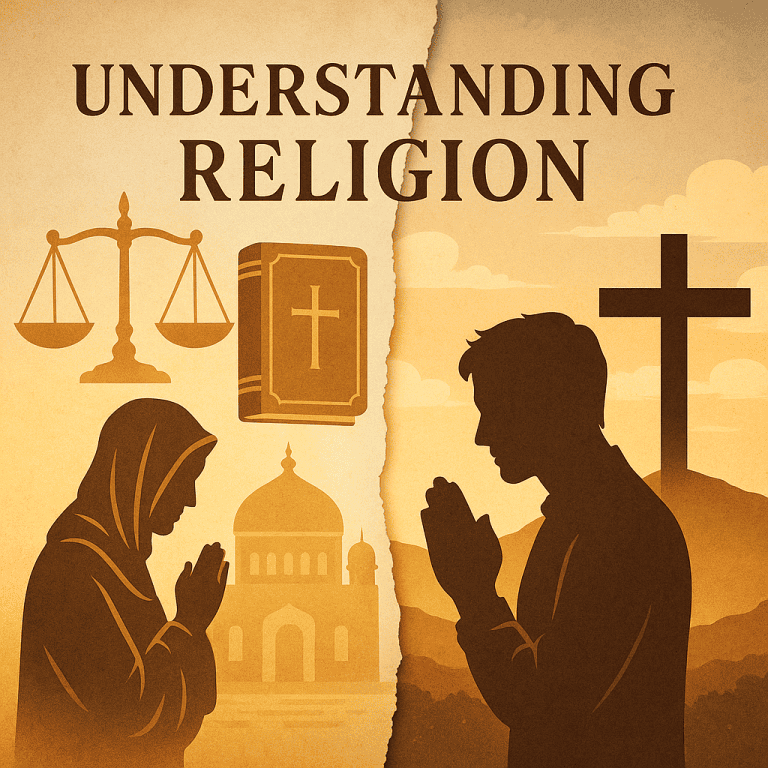Is Divorce the Unforgivable Sin?
If you’ve found yourself facing divorce, you may be asking a frightening question: “Does this mean I’ve lost my salvation? Is divorce the unforgivable sin?”
Scripture answers that question clearly. Divorce is a sin, but it is not the unforgivable sin.
That doesn’t make divorce harmless or inconsequential. The Bible speaks soberly about it, and the pain it causes is real. But forgiveness, repentance, and restoration in Christ are not cut off by divorce.

But let’s get one thing settled right from the start: Divorce is a sin, but it is not the unforgivable sin. Many believers wrestle with this, asking, “Is divorce the unforgivable sin in Christianity?” The answer is clear in Scripture—no, it is not.
That’s a weighty question. The fear behind it is real. The Bible tells us God hates divorce (Malachi 2:16), and for good reason—marriage was meant to be for life. When that covenant is broken, everyone suffers. Spouses, children, extended family, and even church communities all feel the impact.
A Hard Reality and an Honest Question
Some churches act as if divorce is an automatic one-way ticket to hell, while others shrug it off like it’s just another life event. Neither of these positions is biblical. So, let’s take a deep dive into what Scripture actually says about divorce, sin, and salvation.
Salvation Is Not Lost Through Divorce
Let’s deal with the core fear first: Does divorce cause someone to lose their salvation? Many who go through this painful process struggle with the question, “Is divorce the unforgivable sin in Christianity?”
The good news is that Scripture reassures us that our salvation is based on grace, not marital status.
🔹 Ephesians 2:8-9 – “For it is by grace you have been saved, through faith—and this is not from yourselves, it is the gift of God—not by works, so that no one can boast.”
Salvation is not based on whether you stay married or get divorced. It’s based on faith in Jesus Christ. If we could lose our salvation by sinning, none of us would stand a chance.
🔹 Romans 8:38-39 – “For I am convinced that neither death nor life, neither angels nor demons, neither the present nor the future, nor any powers, neither height nor depth, nor anything else in all creation, will be able to separate us from the love of God that is in Christ Jesus our Lord.”
Did you catch that? Nothing can separate us from Christ. Not death. Not sin. Not even divorce.
🔹 John 10:28-29 – “I give them eternal life, and they shall never perish; no one will snatch them out of my hand.”
If you are in Christ, you are secure. Divorce does not change that.
But before you breathe a sigh of relief, let’s be clear: Divorce is a sin. It’s not something to take lightly or justify. Which brings us to the next point.
Is Divorce the Unforgivable Sin in Christianity?
Many believers wonder, ‘Is divorce the unforgivable sin in Christianity?’ The answer is no, and here’s why:
Divorce is always the result of sin—either yours, your spouse’s, or both.
God’s design for marriage was permanence:
🔹 Matthew 19:6 – “So they are no longer two, but one flesh. Therefore what God has joined together, let no one separate.”
From the very beginning, marriage was meant to be a lifelong covenant. And when that covenant is broken, it grieves the heart of God.
But is divorce the worst sin? No. It is not the unforgivable sin.
What Is the Unforgivable Sin?
🔹 Matthew 12:31-32 – “And so I tell you, every kind of sin and slander can be forgiven, but blasphemy against the Spirit will not be forgiven.”
🔹 Mark 3:28-29 – “Truly I tell you, people can be forgiven all their sins and every slander they utter, but whoever blasphemes against the Holy Spirit will never be forgiven; they are guilty of an eternal sin.”

Many people misunderstand what Jesus meant by the unforgivable sin. They ask, “Is divorce the unforgivable sin in Christianity?” but Scripture makes it clear—the unforgivable sin is the continual rejection of Christ and His work through the Holy Spirit. It is not divorce.
🔹 1 John 1:9 – “If we confess our sins, he is faithful and just and will forgive us our sins and purify us from all unrighteousness.”
Divorce is serious. But forgiveness is greater.
Divorce’s Consequences—Church Leadership and Ministry
While divorce does not remove salvation, it does have consequences.
The Bible teaches that church leaders must be “above reproach” and “faithful to their wives” (1 Timothy 3:2, Titus 1:6). Many churches interpret this as disqualifying divorced men from being pastors or elders.
This isn’t a matter of God “not forgiving” a divorced person—it’s about setting a standard for leadership. A broken marriage can impact a leader’s credibility. Some denominations make exceptions for cases of adultery or abandonment, while others do not.
Either way, divorce should never be taken lightly. It affects more than just you.
Biblical Grounds for Divorce—What About Abuse and Abandonment?
Jesus gave one clear exception for divorce:
🔹 Matthew 19:9 – “I tell you that anyone who divorces his wife, except for sexual immorality, and marries another woman commits adultery.”
Paul adds another:
🔹 1 Corinthians 7:15 – “But if the unbeliever leaves, let it be so. The brother or the sister is not bound in such circumstances; God has called us to live in peace.”
Many Christian scholars and churches recognize that abuse—whether physical, emotional, or mental—is a form of abandonment. A spouse who terrorizes their family has already broken the marriage covenant.
God does not command anyone to stay in a home where they are being abused.
🔹 Psalm 34:18 – “The Lord is close to the brokenhearted and saves those who are crushed in spirit.”
Different Faith Views on Divorce
Now, before we dive into this, let’s be clear—what ultimately matters is what God says about divorce, not what different religious traditions teach. But it’s still helpful to understand how various faiths approach this issue, especially when cultural and denominational influences shape how people view marriage, divorce, and remarriage. So, let’s take a look.
Christian Views
🔹 Roman Catholicism – Does not recognize divorce but permits annulments (which are not biblical). If a marriage happened, divorce is what it says it is, and remarriage is what it says it is—not some technical loophole.
🔹 Protestant Christianity – Varies. Evangelicals generally allow divorce for adultery and abandonment, while some denominations strictly prohibit remarriage.
🔹 Eastern Orthodox – Allows divorce for infidelity and abuse.
Other Religions
🔹 Judaism – Allows divorce through a “get” (Deuteronomy 24:1-4).
🔹 Islam – Permits divorce but discourages it.
🔹 Hinduism/Buddhism – Divorce is discouraged but accepted.
Christianity uniquely teaches that salvation is not tied to marital status.
The Cost of Divorce—Especially for Children

Let’s be honest: No one “wins” in a divorce.
- Spouses suffer.
- Finances are strained.
- Families are divided.
- And worst of all—children bear the brunt of it.
Studies show that kids of divorced parents are more likely to struggle with anxiety, depression, and relationship instability.
This is why God hates divorce. Not because He’s being harsh, but because He knows what it does to people. And yet, many still wonder, “Is divorce the unforgivable sin in Christianity?” The truth is, while divorce has painful consequences, it does not put someone beyond God’s grace.
Whenever possible, fight for your marriage. Seek reconciliation. Exhaust every effort before making the decision to separate.
Final Thoughts—God’s Grace is Greater
If you are divorced, this is not the end of your story.
- Jesus still loves you.
- Your salvation is secure.
- You are not beyond redemption.
There is life after divorce. There is healing. And there is grace that covers every sin. So if you’ve been wondering, “Is divorce the unforgivable sin in Christianity?” let this be your answer: God’s grace is bigger than any failure, including divorce. If you are in Christ, your salvation is secure.
🙏 Have questions? Need prayer? Reach out—I’d love to talk with you. Would you like to watch some videos on important biblical topics? Check out my YouTube channel.
Would you like to the learn the biblical doctrine of election? Read up on it in my free pamphlet Chosen by Grace.
Walt Roderick is a Christian writer who cares more about biblical clarity than online applause. He writes to strengthen believers and confront spiritual drift.






